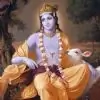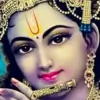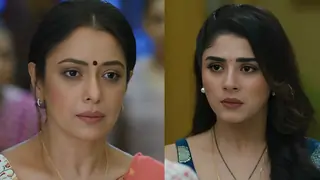Sri Radha Sahasra-nama Stotra
The thousand Names of Radharani
[From the Narada Pancharata, translated by Bhaktivinoda Thakura,
translated into English by Kusakratha Prabhu]
Sri Radha Sahasra-nama was originally spoken by Lord Shiva to Parvati devi,
recorded in the 5th Chapter of Sri Narada Pancaratra.
Texts 1 and 2
Sri Parvati said: O lord of lords, O master of the universe, O master kind to your devotees, if you are kind to me, if you have mercy for me, then, O lord, please tell me all you have heard, the most secret of secrets in your effulgent heart.
Texts 3 and 4
O lord of lords, the transcendental thousand names of Goddess Sri Radha-gopi, which inspire pure devotional service, and which you have never told anyone, please tell to me. Why is the Goddess, who creates and destroys the universes, a gopi?
Text 5
Lord Siva said: O goddess, O queen, please hear this auspicious and very wonderful truth, which destroys sins: For Her their are neither births nor material activities.
Text 6
When Lord Hari, out of a sense of duty, performs activities (in the material world), she, desiring to be near Him, assumes many different forms.
Text 7
I have already explained why She is a gopi. O goddess, now please hear Her thousand names.
Text 8
What I have never spoken in the Tantras and what they who yearn for liberation cherish, out of love for you, I will now speak.
Text 9
Day and night this knowledge is as dear to me as life. O daughter of the mountain king, please hear and regularly chant (these thousand names) as far as you are able.
Text 10
By Her kindness Krsna, the master of Goloka, is the Supreme Master. Narada is the sage of Her thousand holy names.
Text 11
Radha, who grants the four goals of life, is said to be the Supreme Goddess.
(Her thousand names follow.)
Text 11
om sri-radha radhika krsna-
vallabha krsna-samyuta
Om. She is Lord Krsna's greatest worshiper (sri-radha and radhika), Lord Krsna's beloved (krsna-vallabha), and Lord Krsna's constant companion (krsna-samyuta).
Text 12
vrndavanesvari krsna-
priya madana-mohini
srimati krsna-kanta ca
krsnananda-pradayini
She is the queen of Vrndavana (vrndavanesvari), the beloved of Lord Krsna (krsna-priya), more charming than Kamadeva (madana-mohini), beautiful (srimati), Lord Krsna's beloved (krsna-kanta), and the giver of bliss to Lord Krsna (krsnananda-pradayini).
Text 13
yasasvini yasogamya
yasodananana-vallabha
damodara-priya gopi
gopananda-kari tatha
She is famous (yasasvini and yasogamya), the beloved of Yasoda's son (yasodananana-vallabha), dear to Lord Damodara (damodara-priya), a cowherd girl (gopi), and the giver of happiness to the gopas (gopananda-kari).
Text 14
krsnanga-vasini hrdya
hari-kanta hari-priya
pradhana-gopika gopa-
kanya trailokya-sundari
Her residence is on Lord Krsna's limbs (krsnanga-vasini). She is charming (hrdya). She is Lord Hari's beloved (hari-kanta and hari-priya), the most important gopi (pradhana-gopika), the daughter of a gopa (gopa-kanya), and the most beautiful girl in the three worlds (trailokya-sundari).
Text 15
vrndavana-vihari ca
vikasita-mukhambuja
gokulananda-kartri ca
gokulananda-dayini
She enjoys pastimes in Vrndavana (vrndavana-vihari), Her face is a blossoming lotus (vikasita-mukhambuja), and she brings happiness to Gokula (gokulananda-kartri and gokulananda-dayini).
Text 16
gati-prada gita-gamya
gamanagamana-priya
visnu-priya visnu-kanta
visnor anga-nivasini
She gives the goal of life (gati-prada), is approached by chanting her holy names (gita-gamya), is the beloved of the omniprescent Supreme Personality of Godhead (gamanagamana-priya), is Lord Visnu's beloved (visnu-priya and visnu-kanta), and resides on Lord Visnu's limbs (visnor anga-nivasini).
Text 17
yasodananda-patni ca
yasodananda-gehini
kamari-kanta kamesi
kama-lalasa-vigraha
She is the wife of Yasoda's son (yasodananda-patni and yasodananda-gehini), the beloved of lust's enemy (kamari-kanta), Lord Krsna's amorous queen (kamesi), and Lord Krsna's passionate lover (kama-lalasa-vigraha).
Text 18
jaya-prada jaya jiva
jivananda-pradayini
nandanandana-patni ca
vrsabhanu-suta siva
She is the giver of victory (jaya-prada) and She is victory itself (jaya). She is life (jiva), the giver of happiness to the living entities (jivananda-pradayini), the wife of Nanda's son (nandanandana-patni), King Vrsabhanu's daughter (vrsabhanu-suta), and auspicious (siva).
Text 19
ganadhyaksa gavadhyaksa
gavam gatir anuttama
kancanabha hema-gatri
kancanangada-dharini
She is the leader of the gopis (ganadhyaksa), the ruler of the cows (gavadhyaksa and gavam gati), and without superior (anuttama). She has a golden complexion (kancanabha), Her limbs are golden (hema-gatri), and She wears golden armlets (kancanangada-dharini).
Text 20
asoka sokorahita
visoka soka-nasini
gayatri vedamata ca
vedatita vid-uttama
She never laments (asoka, sokorahita, and visoka), she ends lamentation (soka-nasini). She is the Gayatri mantra (gayatri), the mother of the Vedas (veda-mata), beyond the Vedas (vedatita), and the wiseset philosopher (vid-uttama).
Text 21
niti-sastra-priya niti-
gatir matir abhistada
veda-priya veda-garbha
veda-marga-pravardhini
She is an eager student of the scriptures describing ethics (niti-sastra-priya). She is the perfect moralist (niti-gati), the most thoughtful philosopher (mati), the fulfiller of desires (abhistada), an eager student of the Vedas (veda-priya), the mother of the Vedas (veda-garbha), and the teacher of the Vedas' path (veda-marga-pravardhini).
Text 22
veda-gamya veda-para
vicitra-kanakojjvala
tathojjvala-prada nitya
tathaivojjvala-gatrika
She is approached by Vedic study (veda-gamya). She is the supreme goal described in the Vedas (veda-para). She is splendid with wonderful golden ornaments (vicitra-kanakojjvala), glorious (ujjvala-prada), and eternal (nitya), and Her limbs are filled with glory (ujjvala-gatrika).
Text 23
nanda-priya nanda-suta-
radhyanandaprada subha
subhangi vimalangi ca
vilasiny aparajita
She is dear to Maharaja Nanda (nanda-priya), worshiped by Nanda's son (nanda-sutaradhya), delightful (ananda-prada), beautiful (subha), with beautiful limbs (subhangi), with splendid limbs (vimalangi), playful (vilasini), and unconquerable (aparajita).
Text 24
janani janmasunya ca
janma-mrtyu-jarapaha
gatir gatimatam dhatri
dhatranandapradayini
She is the mother of all (janani), without birth (janma-sunya), the remover of birth, death, and old-age (janma-mrtyu-jarapaha), the supreme goal of the aspiring devotees (gatir gatimatam), the mother of all (dhatri), and the giver of bliss to the Supreme Creator (dhatrananda-pradayini).
Text 25
jagannatha-priya saila-
vasini hema-sundari
kisori kamala padma
padma-hasta payoda-da
She is dear to the Lord of the universes (jagannatha-priya), She resides on a hill (saila- vasini), is beautiful and golden (hema-sundari), is youthful (kisori), like a lotus flower (kamala and padma), her hands are lotuses (padma-hasta), and She is buxom (payoda-da).
Text 26
payasvini payo-datri
pavitra sarva-mangala
maha-jiva-prada krsna-
kanta kamala-sundari
She is buxom (payasvini and payo-datri), pure (pavitra), all-auspicious (sarva-mangala), the great giver of life (maha-jiva-prada), Lord Krsna's beloved (krsna-kanta), and beautiful as a lotus (kamala-sundari).
Text 27
vicitra-vasini citra-
vasini citra-rupini
nirguna su-kulina ca
niskulina nirakula
She is wonderfully fragrant (vicitra-vasini and citra-vasini), wonderfully beautiful (citra-rupini), free of the modes of material nature (nirguna), born in a pious family (su-kulina), not born in any family of the material world (niskulina), and free from all distrees (nirakula).
Text 28
gokulantara-geha ca
yogananda-kari tatha
venu-vadya venu-ratih
venu-vadya-parayana
Her home is in Gokula (gokulantara-geha). She delights Lord Krsna when She meets Him (yogananda-kari). She plays the flute (venu-vadya), enjoys playing the flute (venu-rati), and is fond of playing the flute (venu-vadya-parayana).
Text 29
gopalasya priya saumya-
rupa saumya-kulodvaha
mohamoha vimoha ca
gati-nistha gati-prada
She is Lord Gopala's beloved (gopalasya priya). She is gentle and noble (saumya-rupa), born in an exalted family (saumya-kulodvaha), charming (moha and vimoha), and free from bewilderment (amoha), and She gives the goal of life (gati-nistha and gati-prada).
Text 30
girbana-vandya girbana
girbana-gana-sevita
lalita ca visoka ca
visakha citra-malini
The demigods offer repsectful obeisances to Her (girbana-vandya). She is divine (girbana), served by the demigods (girbana-gana-sevita), playful and charming (lalita), free from lamentation (visoka), the star Visakha (visakha), and decorated with wonderful garlands (citra-malini).
Text 31
jitendriya suddha-sattva
kulina kula-dipika
dipa-priya dipa-datri
vimala vimalodaka
She has conquered Her senses (jitendriya). She is situated in pure goodness (suddha-sattva), born in a noble family (kulina), the lamp illuminating Her family (kula-dipika), fond of lamps (dipa-priya), the giver of the lamp (dipa-datri), pure (vimala), and the sacred river (vimalodaka).
Text 32
kantara-vasini krsna
krsnacandra-priya matih
anuttara duhkha-hantri
duhkha-kartri kulodvaha
She lives in a forest (kantara-vasini). She is Lord Krsna's beloved (krsna and krsnacandra-priya). She is thoughtfulness (mati), unsurpassed (anuttara), the remover of sufferings (duhkha-hantri), the creator of sufferings (duhkha-kartri), and the noblest in Her family (kulodvaha).
Text 33
matir laksmir dhrtir lajja
kantih pustih smrtih ksama
ksirodasayini devi
devari-kula-mardini
She is thoughtfulness (mati), Goddess Laksmi (laksmi), perseverance (dhrti), modesty (lajja), beauty (kanti), fulfillment (pusti), memory (smrti), patience (ksama), she who lies down on the ocean of milk (ksirodasayini), the goddess (devi), and the crusher of Lord Krsna's enemies (devari-kula-mardini).
Text 34
vaisnavi ca maha-laksmih
kula-pujya kula-priya
samhartri sarva-daityanam
savitri veda-gamini
She is Lord Visnu's consort (vaisnavi), Goddess Maha-Laksmi (maha-laksmi), worshiped by Her family (kula-pujya), dear to Her family (kula-priya), the destroyer of all the demons (samhartri sarva-daityanam), the gayatri mantra (savitri), and a follower of the Vedas (veda-gamini).
Text 35
vedatita niralamba
niralamba-gana-priya
niralamba-janaih pujya
niraloka nirasraya
She is beyond the Vedas (vedatita), liberated (niralamba), dear to the liberated (niralamba-gana-priya), worshiped by the liberated (niralamba-janaih pujya), unseen by conditioned souls (niraloka), and independent (nirasraya).
Text 36
ekanga sarvaga sevya
brahma-patni sarasvati
rasa-priya rasa-gamya
rasadhisthatr-devata
She has one form (ekanga). She is all-pervading (sarvaga), the supreme object of worship (sevya), Brahma's wife (brahma-patni), Goddess Sarasvati (sarasvati), fond of the rasa dance (rasa-priya), the girl Lord Krsna approaches in the rasa dance (rasa-gamya), and the predominating Deity of the rasa dance (rasadhisthatr-devata).
Text 37
rasika rasikananda
svayam rasesvari para
rasa-mandala-madhyastha
rasa-mandala-sobhita
She enjoys the transcendental mellows (rasika) and tastes the bliss of the transcendental mellows (rasikananda). She is the queen of the rasa dance (svayam rasesvari), transcendental (para), the girl who stays in the middle of the rasa dance circle (rasa-mandala-madhyastha), and the girl who beautifies the rasa dance circle (rasa-mandala-sobhita).
Text 38
rasa-mandala-sevya ca
rasa-krida manohara
pundarikaksa-nilaya
pundarikaksa-gehini
She is served in the rasa dance circle (rasa-mandala-sevya), and She enjoys the pastime of the rasa dance (rasa-krida). She is beautiful (manohara), Her dark eyes are lotus flowers (pundarikaksa-nilaya), and She is the wife of lotus-eyed Krsna (pundarikaksa-gehini).
Text 39
pundarikaksa-sevya ca
pundarikaksa-vallabha
sarva-jivesvari sarva-
jiva-vandya parat para
She is served by lotus-eyed Krsna (pundarikaksa-sevya), dear to lotus-eyed Krsna (pundarikaksa-vallabha), the queen of all living entities (sarva-jivesvari), worshiped by all living entities (sarva-jiva-vandya), and greater than the greatest (parat para).
Text 40
prakrtih sambhu-kanta ca
sadasiva-manohara
ksut pipasa daya nidra
bhrantih srantih ksamakula
She is the goddess of the material nature (prakrti), and the beautiful wife of Lord Siva (sambhu-kanta and sadasiva-manohara). She is hunger (ksut), thirst (pipasa), mercy (daya), sleep (nidra), bewilderment (bhranti), exhaustion (sranti), and patience (ksamakula).
Text 41
vadhu-rupa gopa-patni
bharati siddha-yogini
satya-rupa nitya-rupa
nityangi nitya-gehini
She is a young girl (vadhu-rupa), the wife of a gopa (gopa-patni), the goddess of eloquence (bharati), and perfect in the science of yoga (siddha-yogini). Her form is eternal (satya-rupa, nitya-rupa, and nityangi), and She is Lord Krsna's wife eternally (nitya-gehini).
Text 42
sthana-datri tatha dhatri
maha-laksmih svayam-prabha
sindhu-kanya sthana-datri
dvaraka-vasini tatha
She gives Her devotees their homes (sthana-datri). She is the mother (dhatri), Goddess Maha-Laksmi (maha-laksmi), self-effulgent (svayam-prabha), the daughter of the milk ocean (sindhu-kanya), and she who resides in Dvaraka (dvaraka-vasini).
Text 43
buddhih sthitih sthana-rupa
sarva-karana-karana
bhakti-priya bhakti-gamya
bhaktananda-pradayini
She is intelligence (buddhi), steadiness (sthiti and sthana-rupa), the cause of all causes (sarva-karana-karana), fond of serving Lord Krsna (bhakti-priya), approached by devotional service (bhakti-gamya), and the giver of bliss to the devotees (bhaktananda-pradayini).
Text 44
bhakta-kalpa-drumatita
tathatita-guna tatha
mano-'dhisthatr-devi ca
krsna-prema-parayana
She is more than a kalpa-vrksa tree for the devotees (bhakta-kalpa-drumatita), the possessor of the greatest transcendental virtues (atita-guna), the predominating Deity of the heart (mano-'dhisthatr-devi), and the girl completely in love with Lord Krsna (krsna-prema-parayana).
Text 45
niramaya saumya-datri
tatha madana-mohini
ekanamsa siva ksema
durga durgati-nasini
She is free from all disease (niramaya), the most gentle, kind, and generous (saumya-datri), more charming than Kamadeva (madana-mohini), one without a second (eka and anamsa), the wife of Lord Siva (siva and durga), happiness and auspiciousness personified (ksema), and the person who destroys all calamities (durgati-nasini).
Text 46
isvari sarva-vandya ca
gopaniya subhankari
palini sarva-bhutanam
tatha kamanga-harini
She is the supreme controller (isvari), worshiped by all (sarva-vandya), reclusive (gopaniya), the giver of auspiciousness (subhankari), the protectress of all living entities (palini sarva-bhutanam), and the wife of Lord Siva who destroyed Kamadeva's body (kamanga-harini).
Text 47
sadyo-mukti-prada devi
veda-sara parat para
himalaya-suta sarva
parvati girija sati
She is the person who quickly gives liberation (sadyo-mukti-prada), the goddess (devi), the essence of the Vedas (veda-sara), greater than the greatest (parat para), and Goddess Parvati (himalaya-suta, sarva, parvati, girija, and sati).
Text 48
daksa-kanya deva-mata
manda-lajja hares tanuh
vrndaranya-priya vrnda
vrndavana-vilasini
She is Daksa's daughter (daksa-kanya), the demigods' mother (deva-mata), bold (manda-lajja), Lord Hari's own transcendental form (hares tanuh), fond of Vrndavana (vrndaranya-priya), goddess Vrnda (vrnda), and the girl who enjoys pastimes in Vrndavana (vrndavana-vilasini).
Text 49
vilasini vaisnavi ca
brahmaloka-pratisthita
rukmini revati satya-
bhama jambavati tatha
She is playful (vilasini), Lord Visnu's companion (vaisnavi), the predominating goddess of the spiritual world (brahmaloka-pratisthita), Rukmini (rukmini), Revati (revati), Satyabhama (satyabhama), and Jambavati (jambavati).
Text 50
sulaksmana mitravinda
kalindi jahnu-kanyka
paripurna purnatara
tatha haimavati gatih
She is Sulaksmana (sulaksmana), Mitravinda (mitravinda), Kalindi (kalindi), Jahnavi (jahnu-kanyka), most perfect (paripurna and purnatara), Goddess Parvati (haimavati), and the supreme goal of life (gati).
Text 51
apurva brahma-rupa ca
brahmanda-paripalini
brahmanda-bhanda-madbyastha
brahmanda-bhanda-rupini
She is unprecedented (apurva), spiritual (brahma-rupa), the protectress of the universe (brahmanda-paripalini), the goddess who enters the material universe (brahmanda-bhanda-madbyastha), the goddess who Herself is the material universe (brahmanda-bhanda-rupini).
Text 52
anda-rupanda-madhyastha
tathanda-paripalini
anda-bahyanda-samhartri
siva-brahma-hari-priya
She is the goddess who is the material universe (anda-rupa), the goddess who has entered the material universe (anda-madhyastha), the protectress of the material universe (anda-paripalini), the goddess who is beyond the material universe (anda-bahya), the destroyer of the material universe (anda-samhartri), and she who is dear to Siva, Brahma, and Visnu (siva-brahma-hari-priya).
Text 53
maha-visnu-priya kalpa-
vrksa-rupa nirantara
sara-bhuta sthira gauri
gaurangi sasi-sekhara
She is Lord Maha-Visnu's beloved (maha-visnu-priya), a kalpa-vrksa tree (kalpa-vrksa-rupa), eternal (nirantara and sthira), the best (sara-bhuta), fair (gauri and gaurangi), and Lord Siva's wife (sasi-sekhara).
Text 54
sveta-campaka-varnabha
sasi-koti-sama-prabha
malati-malya-bhusadhya
malati-malya-dharini
She is fair as a sveta campaka flower (sveta-campaka-varnabha), splendid as millions of moons (sasi-koti-sama-prabha), and decorated with jasmine garlands (malati-malya-bhusadhya and malati-malya-dharini).
Text 55
krsna-stuta krsna-kanta
vrndavana-vilasini
tulasy-adhisthatr-devi
samsararnava-para-da
She is praised by Krsna (krsna-stuta) and loved by Krsna (krsna-kanta). She enjoys pastimes in Vrndavana (vrndavana-vilasini). She is Goddess Tulasi (tulasy-adhisthatr-devi). She carries one to the farther shore of the ocean of birth and death (samsararnava-para-da).
Text 56
saradaharadambhoda
yasoda gopa-nandini
atita-gamana gauri
paranugraha-karini
She gives what is the best (sarada). She gives food (aharada). She gives water (ambhoda). She gives fame (yasoda). She is a gopa's daughter (gopa-nandini), very graceful (atita-gamana), fair (gauri), and kind to others (paranugraha-karini).
Text 57
karunarnava-sampurna
karunarnava-dharini
madhavi madhava-mano-
harini syama-vallabha
She is a flooding ocean of mercy (karunarnava-sampurna and karunarnava-dharini). She is Lord Krsna's beloved (madhavi and syama-vallabha), and she charms Lord Krsna's heart (madhava-mano-harini).
Text 58
andhakara-bhaya-dhvasta
mangalya mangala-prada
sri-garbha sri-prada srisa
sri-nivasacyutapriya
She removes the fear of darkness (andhakara-bhaya-dhvasta). She is auspicious (mangalya), the giver of auspiciousness (mangala-prada), the mother of all beauty (sri-garbha), the giver of beauty (sri-prada), the queen of beauty (srisa), the abode of beauty (sri-nivasa), and the beloved of the infallible Supreme Personality of Godhead (acyutapriya).
Text 59
sri-rupa sri-hara srida
sri-kama sri-svarupini
sridamananda-datri ca
sridamesvara-vallabha
She is the form of beauty (sri-rupa and sri-svarupini), the remover of beauty (sri-hara), the giver of beauty (srida), the desire for beauty (sri-kama), the giver of bliss to Sridama (sridamananda-datri), and dear to Sridama's master (sridamesvara-vallabha).
Text 60
sri-nitamba sri-ganesa
sri-svarupasrita srutih
sri-kriya-rupini srila
sri-krsna-bhajananvita
She has beautiful hips (sri-nitamba). She is the beautiful queen of the gopis (sri-ganesa). She is beautiful (sri-svarupasrita and srila). She is the Vedas (sruti) and the activities of devotional service (sri-kriya-rupini). She devotedly worships Sri Krsna (sri-krsna-bhajananvita).
Text 61
sri-radha srimati srestha
srestha-rupa sruti-priya
yogesa yoga-mata ca
yogatita yuga-priya
She worships Lord Krsna (sri-radha). She is beautiful (srimati). She is the best (srestha and srestha-rupa). She is dear to the Vedas (sruti-priya), the queen of yoga (yogesa), the mother of yoga (yoga-mata), beyond yoga (yogatita), and dear to the two divine persons (yuga-priya).
Text 62
yoga-priya yoga-gamya
yogini-gana-vandita
java-kusuma-sankasa
dadimi-kusumopama
She is dear to yoga (yoga-priya), approached by yoga (yoga-gamya), worshiped by the yoginis (yogini-gana-vandita), glorious as a rose (java-kusuma-sankasa), and glorious as a pomegranate (dad imi-kusumopama).
Text 63
nilambaradhara dhira
dhairya-rupa-dhara dhritih
ratna-simhasana-stha ca
ratna-kundala-bhusita
She wears blue garments (nilambara-dhara). She is very sober and serious (dhira and dhairya-rupa-dhara). She is seriousness (dhriti). She sits on a jewel throne (ratna-simhasana-stha) and She is decorated with jewel earrings (ratna-kundala-bhusita).
Text 64
ratnalankara-samyukta
ratna-malya-dhara para
ratnendra-sara-haradhya
ratna-mala-vibhusita
She wears jewel ornaments (ratnalankara-samyukta), a necklace of jewels (ratna-malya-dhara and ratna-mala-vibhusita), and a necklace of the kings of jewels (ratnendra-sara-haradhya). She is transcendental (para).
Text 65
indranila-mani-nyasta-
pada-padma-subha sucih
karttiki paurnamasi ca
amavasya bhayapaha
Her lotus feet are beautiful with sapphire ornaments (indranila-mani-nyasta-pada-padma-subha) and She is beautiful (suci). She is the month of Karttika (karttiki), the full-moon day (paurnamasi), the new-moon day (amavasya), and the remover of fears (bhayapaha).
Text 66
govinda-raja-grhini
govinda-gana-pujita
vaikuntha-natha-grhini
vaikuntha-paramalaya
She is Lord Govinda's queen (govinda-raja-grhini) and She is worshiped by Lord Govinda's devotees (govinda-gana-pujita). She is the queen of Vaikuntha's king (vaikuntha-natha-grhini) and She resides in the supreme abode of Vaikuntha (vaikuntha-paramalaya).
Text 67
vaikunthadeva-devadhya
tatha vaikuntha-sundari
mahalasa vedavati
sita sadhvi pati-vrata
She is glorious in the comopany of Vaikuntha's supreme king (vaikuntha-deva-devadhya) and She is the beautiful goddess of Vaikuntha (vaikuntha-sundari). She is languid (mahalasa), wise (vedavati), saintly (sadhvi), and devoted to Her Lord (pati-vrata). She is Goddess Sita (sita).
Text 68
anna-purna sadananda-
rupa kaivalya-sundari
kaivalya-dayini srestha
gopinatha-manohara
She is Goddess Durga (anna-purna). Her form is full of eternal bliss (sadananda-rupa). She is the most beautiful (kaivalya-sundari), the giver of liberation (kaivalya-dayini), the best (srestha), and the girl who charms Lord Gopinatha's heart (gopinatha-manohara).
Text 69
gopinathesvari candi
nayika-nayananvita
nayika nayaka-prita
nayakananda-rupini
She is Lord Gopinatha's queen (gopinathesvari). She is passionate (candi). She has the eyes of a beautiful heroine (nayika-nayananvita). She is a beautiful heroine (nayika). She is dear to the hero Krsna (nayaka-prita). She delights the hero Krsna (nayakananda-rupini).
Text 70
sesa sesavati sesa-
rupini jagad-ambika
gopala-palika maya
jayanandaprada tatha
She reclines on Lord Sesa (sesa, sesavati, and sesa-rupini). She is the mother of the universe (jagad-ambika), the protectress of the cowherd people (gopala-palika), the Lord's illusory potency (maya), and she who gives the bliss of victory (jayanandaprada).
Text 71
kumari yauvanananda
yuvati gopa-sundari
gopa-mata janaki ca
janakananda-karini
She is a young girl (kumari and yuvati), filled with the bliss of youthfulness (yauvanananda), a beautiful gopi (gopa-sundari), the mother of the gopas (gopa-mata), the daughter of King Janaka (janaki), and the girl who gives bliss to King Janaka (janakananda-karini).
Text 72
kailasa-vasini rambha
vairagyakula-dipika
kamala-kanta-grhini
kamala kamalalaya
She is the Goddess who resides on Mount Kailasa (kailasa-vasini). She is the apsara Rambha (rambha). She is a glowing lamp of renunciation (vairagyakula-dipika). She is Lord Narayana's wife (kamala-kanta-grhini). She is the goddess of fortune (kamala) and the abode where the goddess of fortune resides (kamalalaya).
Text 73
trailokya-mata jagatam
adhisthatri priyambika
hara-kanta hara-rata
harananda-pradayini
She is the mother of the three worlds (trailokya-mata), the predominating Deity of the universes (jagatam adhisthatri), the beloved (priya), the mother (ambika), the beloved of Lord Siva (hara-kanta and hara-rata), and She who gives bliss to Lord Siva (harananda-pradayini).
Text 74
hara-patni hara-prita
hara-tosana-tatpara
haresvari rama-rata
rama ramesvari rama
She is Lord Siva's wife (hara-patni), Lord Siva's beloved (hara-prita), devoted to pleasing Lord Siva (hara-tosana-tatpara), Lord Siva's queen (haresvari), Lord Rama's beloved (rama-rata and rama), and Lord Rama's queen (ramesvari).
Text 75
syamala citra-lekha ca
tatha bhuvana-mohini
su-gopi gopa-vanita
gopa-rajya-prada subha
She is Lord Krsna's beloved (syamala), wonderfully beautiful (citra-lekha), the enchantress of the three worlds (bhuvana-mohini), a beautiful gopi (su-gopi and gopa-vanita), she who gives a kingdom to the gopas (gopa-rajya-prada), and beautiful (subha).
Text 76
angavapurna maheyi
matsya-raja-suta sati
kaumari narasimhi ca
varahi nava-durgika
She is beautiful (angavapurna), the queen of the earth (maheyi), the daughter of Matsyaraja (matsya-raja-suta), saintly (sati), a young girl (kaumari), Lord Nrsimha's beloved goddess of fortune (narasimhi), Lord Varaha's beloved (varahi), and the mother of the nine Durgas (nava-durgika).
Text 77
cancala cancalamoda
nari bhuvana-sundari
daksa-yajna-hara daksi
daksa-kanya su-locana
She is fickle (cancala and cancalamoda), appears to be a human girl (nari), is the most beautiful girl in the worlds (bhuvana-sundari), stopped Daksa's yajna (daksa-yajna-hara), is Daksa's daughter (daksi and daksa-kanya), and has beautiful eyes (su-locana).
Text 78
rati-rupa rati-prita
rati-srestha rati-prada
ratir laksmana-geha-stha
viraja bhuvanesvari
She is beautiful (rati-rupa), delightful (rati-prita and rati-prada), the most delightful (rati-srestha) happiness (rati), the goddess who stays in Laksmana's home (laksmana-geha-stha), free from the world of matter (viraja), and the queen who rules the worlds (bhuvanesvari).
Text 79
sankhaspada harer jaya
jamatr-kula-vandita
bakula bakulamoda-
dharini yamuna jaya
She has countless transcendental abodes (sankhaspada). She is Lord Hari's wife (harer jaya). She is worshiped by Her in-laws (jamatr-kula-vandita). She is beautiful as a bakula flower (bakula) and fragrant as a bakula flower (bakulamoda-dharini). She is the Yamuna river (yamuna) and the goddess of victory (jaya).
Text 80
vijaya jaya-patni ca
yamalarjuna-bhanjini
vakresvari vakra-rupa
vakra-viksana-viksita
She is the goddess of victory (vijaya), the wife of the Lord of victory (jaya-patni), the beloved of He who broke the yamalarjuna trees (yamalarjuna-bhanjini), the queen of the crooked and deceptive (vakresvari), graceful (vakra-rupa), and a girl expert at crooked glances (vakra-viksana-viksita).
Text 81
aparajita jagannatha
jagannathesvari yatih
khecari khecara-suta
khecaratva-pradayini
She is unconquerable (aparajita), the queen of the universes (jagannatha), she who controls the king of the universes (jagannathesvari), renounced (yati), a goddess who lives in the celestial worlds (khecari khecara-suta), and one who brings others to the celestial worlds (khecaratva-pradayini).
Text 82
visnu-vaksah-sthala-stha ca
visnu-bhavana-tatpara
candra-koti-sugatri ca
candranana-manohari
She rests on Lord Visnu's chest (visnu-vaksah-sthala-stha) and is rapt in meditation on Lord Visnu (visnu-bhavana-tatpara). She is beautiful as millions of moons (candra-koti-sugatri) and Her moonlike face is very beautiful (candranana-manohari).
Text 83
seva-sevya siva ksema
tatha ksema-kari vadhuh
yadavendra-vadhuh sevya
siva-bhakta sivanvita
She should be served with devotion (seva-sevya). She is Lord Siva's beloved (siva). She is patience (ksema), patient (ksema-kari), a beautiful girl (vadhu), the wife of the Yadavas' king (yadavendra-vadhu), the object of devotional service (sevya), a great devotee of Lord Siva (siva-bhakta), and Lord Siva's companion (sivanvita).
Text 84
kevala nisphala suksma
maha-bhimabhayaprada
jimuta-rupa jaimuti
jitamitra-pramodini
She is liberated (kevala), free from the fruits of karma (nisphala), subtle (suksma), terrifying (maha-bhima), the giver of fearlessness (abhayaprada), the sustainer (jimuta-rupa), Lord Visnu's beloved (jaimuti), and the girl who delights Lord Visnu (jitamitra-pramodini).
Text 85
gopala-vanita nanda
kulajendra-nivasini
jayanti yamunangi ca
yamuna-tosa-karini
She is Lord Gopala's beloved (gopala-vanita), dear to King Nanda (nanda), of noble birth (kulaja), the resident of a king's palace (indra-nivasini), glorious (jayanti), a girl who stays by the Yamuna (yamunangi), and a girl who pleases the Yamuna (yamuna-tosa-karini).
Text 86
kali-kalmasa-bhanga ca
kali-kalmasa-nasini
kali-kalmasa-rupa ca
nityananda-kari krpa
She breaks and destroys the sins of Kali-yuga (kali-kalmasa-bhanga and kali-kalmasa-nasini). She is expert at enjoying pastimes of quarreling with Lord Krsna (kali-kalmasa-rupa). She brings Lord Krsna eternal bliss (nityananda-kari). She is kindness personified (krpa).
Text 87
krpavati kulavati
kailasacala-vasini
vama-devi vama-bhaga
govinda-priya-karini
She is merciful (krpavati), born in a very respectable and noble family (kulavati), the goddess who resides on Mount Kailasa (kailasacala-vasini), beautiful (vama-devi and vama-bhaga), and she who delights Lord Govinda (govinda-priya-karini).
Text 88
nagendra-kanya yogesi
yogini yoga-rupini
yoga-siddha siddha-rupa
siddha-ksetra-nivasini
She is the daughter of Nagaraja (nagendra-kanya), the queen of yoga (yogesi) a performer of yoga (yogini), yoga personified (yoga-rupini), the perfection of yoga (yoga-siddha), the perfection of yoga personified (siddha-rupa), and she who resides in a sacred place (siddha-ksetra-nivasini).
Text 89
ksetradhisthatr-rupa ca
ksetratita kula-prada
kesavananda-datri ca
kesavananda-dayini
She is the predominating Deity of sacred places (ksetradhisthatr-rupa), beyond all places in this world (ksetratita), born in a noble family (kula-prada), and the giver of happiness to Lord Kesava (kesavananda-datri and kesavananda-dayini).
Text 90
kesava kesava-prita
kesavi kesava-priya
rasa-krida-kari rasa-
vasini rasa-sundari
She is Lord Kesava's beloved (kesava, kesava-prita, kesavi, and kesava-priya), the enjoyer of the rasa-dance pastimes (rasa-krida-kari), the girl who stays in the rasa-dance arena (rasa- vasini), and the beautiful girl of the raasa dance (rasa-sundari).
Text 91
gokulanvita-deha ca
gokulatva-pradayini
lavanga-namni narangi
naranga-kula-mandana
She stays in Gokula (gokulanvita-deha), gives residence in Gokula to others (gokulatva-pradayini), has a name beautiful as a a lavangha flower (lavanga-namni), is amorous (narangi), and is the transcendental decoration of amorous Krsna (naranga-kula-mandana).
Text 92
ela-lavanga-karpura-
mukha-vasa-mukhanvita
mukhya mukhya-prada mukhya-
rupa mukhya-nivasini
She is anointed with ela, lavanga, karpura and many other fragrances (ela-lavanga-karpura-mukha-vasa-mukhanvita), is the most exalted of young girls (mukhya), gives the most valuable thing (mukhya-prada), has the most beautiful form (mukhya-rupa), and lives in the best abode (mukhya-nivasini).
Text 93
narayani kripatita
karunamaya-karini
karunya karuna karna
gokarna naga-karnika
She is Lord Narayana's beloved (narayani). She is supremely merciful (krpatita, karunamaya-karini, karunya, and karuna). She is the sacred place Gokarna (gokarna), Karna (karna), and Naga-karnika (naga-karnika).
Text 94
sarpini kaulini ksetra-
vasini jagad-anvaya
jatila kutila nila
nilambaradhara subha
She is graceful (sarpini), born in a noble family (kaulini), a resident of holy places (ksetra-vasini), the mother of the universes (jagad-anvaya), an ascetic (jatila), crooked (kutila), beauitful (nila and subha), and dressed in blue garments (nilambaradhara).
Text 95
nilambara-vidhatri ca
nilakantha-priya tatha
bhagini bhagini bhogya
krsna-bhogya bhagesvari
She is dressed in blue garments (nilambara-vidhatri). She is Lord Siva's beloved (nilakantha-priya). She is beautiful (bhagini, bhagini, and bhogya), Lord Krsna's happiness (krsna-bhogya), and the queen of transcendental opulences (bhagesvari).
Text 96
balesvari balaradhya
kanta kanta-nitambini
nitambini rupavati
yuvati krsna-pivari
She is Lord Balarama's queen (balesvari), worshiped by Lord Balarama (balaradhya), beautiful (kanta and rupavati), a girl with beautiful hips (kanta-nitambini nitambini), youthful (yuvati), and Lord Krsna's beloved (krsna-pivari).
Text 97
vibhavari vetravati
sankata kutilalaka
narayana-priya salila
srkkani-parimohita
She is amorous (vibhavari). She holds a stick (vetravati). She is slender (sankata). Her hair is curly (kutilalaka). She is Lord Narayana's beloved (narayana-priya). She resides on a hill (salila). With the movements of Her mouth She ecnhants Lord Krsna (srkkani-parimohita).
Text 98
drk-pata-mohita pratar-
asini navanitika
navina nava-nari ca
naranga-phala-sobhita
With a glance She enchants Lord Krsna (drk-pata-mohita). She eats breakfast early (pratar-asini) and churns butter (navanitika). She is young (navina nava-nari), and she is splendid as a naranga fruit (ca naranga-phala-sobhita).
Text 99
haimi hema-mukhi candra-
mukhi sasi-su-sobhana
ardha-candra-dhara candra-
vallabha rohini tamih
She is splendid as gold (haimi). Her face is golden (hema-mukhi). Her face is like the moon (candra-mukhi). She is beautiful as the moon (sasi-su-sobhana), like a graceful half-moon (ardha-candra-dhara), dear to moonlike Krsna (candra-vallabha), a beautiful young girl (rohini), and splendid as the night (tami).
Text 100
timingla-kulamoda-
matsya-rupanga-harini
karani sarva-bhutanam
karyatita kisorini
She became the beloved of Lord Matsya and delighted the timingilas (timingla-kulamoda-matsya-rupanga-harini). She is the mother of all living entities (karani sarva-bhutanam). She is beyond all material duties (karyatita). She is a beautiful young girl (kisorini).
Text 101
kisora-vallabha kesa-
karika kama-karika
kamesvari kama-kala
kalindi-kula-dipika
She is youthful Krsna's beloved (kisora-vallabha). She has beautiful hair (kesa-karika). She is passionate (kama-karika), the queen of amorous pastimes (kamesvari), expert at amorous pastimes (kama-kala), and the lamp that splendidly shines on the Yamuna's shore (kalindi-kula-dipika).
Text 102
kalindatanaya-tira-
vasini tira-gehini
kadambari-pana-para
kusumamoda-dharini
She has made Her home on the Yamuna's shore (kalindatanaya-tira-vasini and tira-gehini). She is fond of drinking kadambari nectar (kadambari-pana-para). She is fragrant with many flowers (kusumamoda-dharini).
Text 103
kumuda kumudananda
krsnesi kama-vallabha
tarkali vaijayanti ca
nimba-dadima-rupini
She is like a kumuda flower (kumuda). She is pleased by the kumuda flowers (kumudananda). She is Lord Krsna's queen (krsnesi) and passionate lover (kama-vallabha). She is an expert logician (tarkali). She is glorious (vaijayanti). Her form is like a nimba or a pomegranate tree (nimba-dadima-rupini).
Text 104
bilva-vrksa-priya krsnam-
bara bilvopama-stani
bilvatmika bilva-vapur
bilva-vrksa-nivasini
She is fond of the bilva tree (bilva-vrksa-priya). She is Lord Krsna's garment (krsnambara). Her breasts are like bilva fruits (bilvopama-stani). Her form is like a bilva tree (bilvatmika and bilva-vapuh). She stays under a bilva tree (bilva-vrksa-nivasini).
Text 105
tulasi-tosika taiti-
lananda-paritosika
gaja-mukta maha-mukta
maha-mukti-phala-prada
She pleases tulasi (tulasi-tosika). She pleases Taitilananda (taitilananda-paritosika). She is decorated with gaja pearls (gaja-mukta, maha-mukta, and maha-mukti-phala-prada).
Text 106
ananga-mohini sakti-
rupa sakti-svarupini
panca-sakti-svarupa ca
saisavananda-karini
She is is charming and passionate (ananga-mohini). She is Lord Krsna's transcendental potency (sakti-rupa and sakti-svarupini). She is the personification of five transcendental potencies (panca-sakti-svarupa). She is filled with the happiness of youth (saisavananda-karini).
Text 107
gajendra-gamini syama-
latananga-lata tatha
yosit-sakti-svarupa ca
yosid-ananda-karini
She is graceful as an elephant (gajendra-gamini). She is a flowering vine of beauty (syama-lata) and a flowering vine of passionate desires (ananga-lata). She is the personification of feminine power (yosit-sakti-svarupa) and feminine bliss (yosid-ananda-karini).
Text 108
prema-priya prema-rupa
premananda-tarangini
prema-hara prema-datri
prema-saktimayi tatha
She passionately loves Lord Krsna (prema-priya). She is the form of all transcendental love (prema-rupa). She is an ocean filled with waves of transcendental love (premananda-tarangini). She is the giver of transcendental love (prema-hara and prema-datri). She is full of the power of transcendental love (prema-saktimayi).
Text 109
krsna-premavati dhanya
krsna-prema-tarangini
prema-bhakti-prada prema
premananda-tarangini
She loves Lord Krsna (krsna-premavati). She is fortunate (dhanya). She is an ocean filled with waves of love for Lord Krsna (krsna-prema-tarangini). She gives loving devotional service (prema-bhakti-prada). She is transcendental love (prema). She is an ocean filled with waves of the bliss of transcendental love (premananda-tarangini).
Text 110
prema-krida-paritangi
prema-bhakti-tarangini
premartha-dayini sarva-
sveta nitya-tarangini
Her limbs are filled with amorous playfulness (prema-krida-paritangi). She is an ocean filled with waves of loving devotional service (prema-bhakti-tarangini). She gives a great wealth of transcendental love (premartha-dayini). She is fair (sarvasveta), and She is an ocean of eternity (nitya-tarangini).
Text 111
hava-bhavanvita raudra
rudrananda-prakasini
kapila srnkhala kesa-
pasa-sambandhini ghati
She is expert at flirting with Lord Krsna (hava-bhavanvita). She is Lord Siva's beloved (raudra). She delights Lord Siva (rudrananda-prakasini). She is fair (kapila). She is the shackle that binds Lord Krsna (srnkhala). She carefully braids Her hair (kesa-pasa-sambandhini). She carries a jug (ghati).
Text 112
kutira-vasini dhumra
dhumra-kesa jalodari
brahmanda-gocara brahma-
rupini bhava-bhavini
She lives in a cottage (kutira-vasini). She is Goddess Durga (dhumra). Her hair is dark as smoke (dhumra-kesa). She resides in the milk-ocean (jalodari). She has descended to the material world (brahmanda-gocara). Her form is spiritual (brahma-rupini). She is full of transcendental love (bhava-bhavini).
Text 113
samsara-nasini saiva
saivalananda-dayini
sisira hema-ragadbya
megha-rupati-sundari
She destroys the cycle of repeated birth and death (samsara-nasini). She is Lord Siva's beloved (saiva). She bears the pleasing fragrance of saivala (saivalananda-dayini). She is pleasantly cool (sisira), Her complexion is golden (hema-ragadbya), Her form is glorious as a cloud (megha-rupa), and She is very beautiful (ati-sundari).
Text 114
manorama vegavati
vegadhya veda-vadini
dayanvita dayadhara
daya-rupa susevini
She is beautiful (manorama), quick (vegavati and vegadhya), eloquent in speaking the Vedas (veda-vadini), merciful (dayanvita, dayadhara, and daya-rupa), and the proper object of devotional service (susevini).
Text 115
kisora-sanga-samsarga
gaura-candranana kala
kaladhinatha-vadana
kalanathadhirohini
She meets youthful Krsna (kisora-sanga-samsarga), Her face is a brilliant moon (gaura-candranana), She is a crescent moon (kala), Her face is a full moon (kaladhinatha-vadana), and She is glorious as a full moon (kalanathadhirohini).
Text 116
viraga-kusala hema-
pingala hema-mandana
bhandira-talavana-ga
kaivarti pivari suki
She is renounced (viraga-kusala), Her complexion is golden (hema-pingala), She is decorated with golden ornaments (hema-mandana), She goes to Bhandiravana and Talavana (bhandira-talavana-ga), She catches the fish that is Sri Krsna (kaivarti), She is a beautiful young girl (pivari), and She is graceful (suki).
Text 117
sukadeva-gunatita
sukadeva-priya sakhi
vikalotkarsini kosa
kauseyambara-dharini
Her virtues are beyond the power of Sukadeva Gosvami to describe (sukadeva-gunatita), She is dear to Sukadeva Gosvami (sukadeva-priya), She is friendly (sakhi), She picks up the fallen and unhappy (vikalotkarsini), She is a treasure-house of transcendental opulences (kosa), and She is dressed in elegant silk garments (kauseyambara-dharini).
Text 118
kosavari kosa-rupa
jagad-utpatti-karika
srsti-sthiti-kari samha-
rini samhara-karini
She is a treasure-house of transcendental opulences (kosavari and kosa-rupa), the mother of the universes (jagad-utpatti-karika), the creature and maintainer of the universes (srsti-sthiti-kari), and the destroyer of the universes (samharini and samhara-karini).
Text 119
kesa-saivala-dhatri ca
candra-gatri su-komala
padmangaraga-samraga
vindhyadri-parivasini
Her hair is dark moss (kesa-saivala-dhatri), and Her limbs are moons (candra-gatri). She is very gentle and delicate (su-komala), She is anointed with lotus cosmetics (padmangaraga-samraga), and She has a home in the Vindhya Hills (vindhyadri-parivasini).
Text 120
vindhyalaya syama-sakhi
sakhi samsara-ragini
bhuta bhavisya bhavya ca
bhavya-gatra bhavatiga
She has a home in the Vindhya Hills (vindhyalaya), is the intimate friend of Lord Krsna (syama-sakhi), is friendly (sakhi), loves the world (samsara-ragini), existed in the past (bhuta), will continue to exist in the future eternally (bhavisya), and exists in the present (bhavya). Her limbs are beautiful (bhavya-gatra), and She is beyond the material world of repeated birth and death (bhavatiga).
Text 121
bhava-nasanta-kariny a-
kasa-rupa su-vesini
rati-ranga-parityaga
rati-vega rati-prada
She puts an end to the cycle of repeated birth and death (bhava-nasanta-karini), Her form is spiritual and subtle (akasa-rupa), She is beautifully dressed (su-vesini), She left the arena of amorous pastimes (rati-ranga-parityaga, and She enjoys the happiness of amorous pastimes (rati-vega and rati-prada).
Text 122
tejasvini tejo-rupa
kaivalya-patha-da subha
mukti-hetur mukti-hetu-
langhini langhana-ksama
She is splendid and powerful (tejasvini and tejo-rupa), gives the path of liberation (kaivalya-patha-da), is beautiful (subha), is the cause of liberation (mukti-hetur), jumps over impersonal liberation (mukti-hetu-langhini), and is tolerant of offenses (langhana-ksama).
Text 123
visala-netra vaisali
visala-kula-sambhava
visala-grha-vasa ca
visala-vadari ratih
She has large eyes (visala-netra), comes from an exalted family (vaisali, visala-kula-sambhava, visala-grha-vasa, and visala-vadari), and is transcendental happiness personified (rati).
Text 124
bhakty-atita bhakta-gatir
bhaktika siva-bhakti-da
siva-sakti-svarupa ca
sivardhanga-viharini
By serving Her one crosses beyond the world of repeated birth and death (bhakty-atita), She is the goal of devotional service (bhakta-gati), She is devotional service (bhaktika), She gives auspicious devotional service (siva-bhakti-da), She is an auspicious potency of the Lord (siva-sakti-svarupa), and She enjoys pastimes as the beloved who is half the body of the auspicious Lord (sivardhanga-viharini).
Text 125
sirisa-kusumamoda
sirisa-kusumojjvala
sirisa-mrdhvi sairisi
sirisa-kusumakrtih
She is fragrant as a sirisa flower (sirisa-kusumamoda), splendid as a sirisa flower (sirisa-kusumojjvala), soft as a sirisa flower (sirisa-mrdhvi), glorious as a sirisa flower (sairisi), and beautiful as a sirisa flower (sirisa-kusumakrti).
Text 126
vamanga-harini visnoh
siva-bhakti-sukhanvita
vijita vijitamoda
gagana gana-tosita
She stays at Lord Visnu's left side (vamanga-harini visnoh), She is filled with the auspicious happiness of devotional service (siva-bhakti-sukhanvita), She is defeated by Lord Krsna (vijita), She is fragrant (vijitamoda), She is the spiritual sky (gagana), and She is pleased by Her companions (gana-tosita).
Text 127
hayasya heramba-suta
gana-mata sukhesvari
duhkha-hantri duhkha-hara
sevitepsita-sarvada
She is Lord Hayagriva's beloved (hayasya), Heramba's daughter (heramba-suta), the demigods' mother (gana-mata), the queen of happiness (sukhesvari), the destroyer of sufferings (duhkha-hantri and duhkha-hara), and the goddess who grants everything Her servants wish (sevitepsita-sarvada).
Text 128
sarvajnatva-vidhatri ca
kula-ksetra-nivasini
lavanga pandava-sakhi
sakhi-madhya-nivasini
She gives omniscience (sarvajnatva-vidhatri). She stays in Her family's place (kula-ksetra-nivasini). She is a lavanga flower (lavanga). She is the Pandavas' friend (pandava-sakhi). She stays with Her friends (sakhi-madhya-nivasini).
Text 129
gramya gita gaya gamya
gamanatita-nirbhara
sarvanga-sundari ganga
ganga-jalamayi tatha
She stays in the village of Vraja (gramya). She is glorified in song (gita). She is the holy city of Gaya (gaya). She is approached by the devotees (gamya). She cannot be approached by non-devotees (gamanatita-nirbhara). All Her limbs are very beautiful (sarvanga-sundari). She is the Ganges (ganga and ganga-jalamayi).
Text 130
gangerita puta-gatra
pavitra-kula-dipika
pavitra-guna-siladhya
pavitrananda-dayini
She is said to be the Ganges (gangerita). Her body is pure and transcendental (puta-gatra). She is a lamp shining in a pure family (pavitra-kula-dipika). She is rich with pure virtues and noble character (pavitra-guna-siladhya). She gives pure transcendental bliss (pavitrananda-dayini).
Text 131
pavitra-guna-simadhya
pavitra-kula-dipani
kampamana kamsa-hara
vindhyacala-nivasini
She is rich with the most exalted pure virtues (pavitra-guna-simadhya). She is a lamp shining in a pure family (pavitra-kula-dipani). She trembles (kampamana). She is the beloved of He who killed Kamsa (kamsa-hara). She has a home in the Vindhya Hills (vindhyacala-nivasini).
Text 132
govardhanesvari govar-
dhana-hasya hayakrtih
minavatara minesi
gaganesi haya gaji
She is the queen of Govardhana Hill (govardhanesvari). She smiles on Govardhana Hill (govardhana-hasya). She is Lord Haragriva's beloved (hayakrti and haya) and Lord Matsya's beloved (minavatara and minesi). She is the queen of the spiritual sky (gaganesi). She is an amorous girl (gaji).
Text 133
harini harini hara-
dharini kanakakrtih
vidyut-prabha vipra-mata
gopa-mata gayesvari
She is beautiful as a doe (harini). She is captivating (harini). She wears a beautiful necklace (hara-dharini). Her form is golden (kanakakrti). She is splendid as lightning (vidyut-prabha). She is the mother of the brahmanas (vipra-mata), the mother of the gopas (gopa-mata). and the queen of Gaya (gayesvari).
Text 134
gavesvari gavesi ca
gavisi gavi-vasini
gati-jna gita-kusala
danujendra-nivarini
She is the queen of the surabhi cows (gavesvari, gavesi, and gavisi). She lives in the cowherd village of Vraja (gavi-vasini). She knows the real goal of life (gati-jna). Her glories are sung in beautiful songs (gita-kusala). She stopped the king of the demons (danujendra-nivarini).
Text 135
nirvana-datri nairvani
hetu-yukta gayottara
parvatadhinivasa ca
nivasa-kusala tatha
She gives liberation (nirvana-datri). She is liberated (nairvani). She is an expert logician (hetu-yukta). She is the queen of Gaya (gayottara). She lives on a mountain (parvatadhinivasa). She brings beauty and auspiciousness to Her home (nivasa-kusala).
Text 136
sannyasa-dharma-kusala
sannyasesi saran-mukhi
sarac-candra-mukhi syama-
hara ksetra-nivasini
She is beautiful with renunciation (sannyasa-dharma-kusala). She is the queen of renunciation (sannyasis (sannyasesi). Her face is like autumn (saran-mukhi). Her face is an autumn moon (sarac-candra-mukhi). She is a necklace worn by Lord Krsna (syama-hara). She lives in a sacred place (ksetra-nivasini).
Text 137
vasanta-raga-samraga
vasanta-vasanakrtih
catur-bhuja sad-bhuja
dvi-bhuja gaura-vigraha
The melodies of vasanta-raga fill Her with amorous desires (vasanta-raga-samraga). Her form is filled with the desires of spring (vasanta-vasanakrti). Sometimes She has four arms (catur-bhuja), and sometimes six arms (sad-bhuja). She has two arms (dvi-bhuja) and Her complexion is fair (gaura-vigraha).
Text 138
sahasrasya vihasya ca
mudrasya mada-dayini
prana-priya prana-rupa
prana-rupiny apavrta
She is the beloved of thousand-headed Lord Ananta Sesa (sahasrasya). She laughs (vihasya). Her face is very expressive (mudrasya). She fills Lord Krsna with amorous passion (mada-dayini). She is more dear to Him than life (prana-priya, prana-rupa, and prana-rupini). She appears before Her devotees (apavrta).
Text 139
krsna-prita krsna-rata
krsna-tosana-tat-para
krsna-prema-rata krsna-
bhakta bhakta-phala-prada
She pleases Lord Krsna (krsna-prita and krsna-rata). She is devoted to pleasing Lord Krsna (krsna-tosana-tat-para). She loves Lord Krsna (krsna-prema-rata and krsna-bhakta). She gives Her devotees the fruits of their service (bhakta-phala-prada).
Text 140
krsna-prema prema-bhakta
hari-bhakti-pradayini
caitanya-rupa caitanya-
priya caitanya-rupini
She loves Krsna (krsna-prema and prema-bhakta). She gives others devotion to Lord Krsna (hari-bhakti-pradayini). She is present in the form of Lord Caitanya (caitanya-rupa and caitanya-rupini). She is dear to Lord Caitanya (caitanya-priya).
Text 141
ugra-rupa siva-kroda
krsna-kroda jalodari
mahodari maha-durga-
kantara-sustha-vasini
She manifests the terrible form of Durga-devi (ugra-rupa), where She sits on Lord Siva's lap (siva-kroda). She sits on Lord Krsna's lap (krsna-kroda). She rests on the milk-ocean (jalodari). She descends to the material world (mahodari). She happily lives in a great forest that is like an unapproachable fortress (maha-durga-kantara-sustha-vasini).
Text 142
candravali candra-kesi
candra-prema-tarangini
samudra-mathanodbhuta
samudra-jala-vasini
She is glorious as a host of moons (candravali and candra-kesi). She is an ocean the moon of Sri Krsna fills with waves of love (candra-prema-tarangini). She was born from the churning of the milk-ocean (samudra-mathanodbhuta) and She resides on the ocean of milk (samudra-jala-vasini).
Text 143
samudramrta-rupa ca
samudra-jala-vasika
kesa-pasa-rata nidra
ksudha prema-tarangika
Her form is an ocean of nectar (samudramrta-rupa). She resides on the milk-ocean (samudra-jala-vasika). She carefully braids Her hair (kesa-pasa-rata). She is sleep (nidra), hunger (ksudha), and an ocean filled with waves of love (prema-tarangika).
Text 144
durva-dala-syama-tanur
durva-dala-tanu-ccbavih
nagara nagari-raga
nagarananda-karini
Her form is glorious as a blade of durva grass (durva-dala-syama-tanu and durva-dala-tanu-ccbavi). She is hero Krsna's beloved (nagara). She is His passionate heroine (nagari-raga). She delights the hero Krsna (nagarananda-karini).
Text 145
nagaralingana-para
nagarangana-mangala
ucca-nica haimavati
priya krsna-taranga-da
She earnestly embraces the hero Krsna (nagaralingana-para). She is happy to embrace the hero Krsna (nagarangana-mangala). She is very humble (ucca-nica). She is Goddess Parvati (haimavati). She is Lord Krsna's beloved (priya). She is an ocean filled with waves of love for Lord Krsna (krsna-taranga-da).
Text 146
premalingana-siddhangi
siddha sadhya-vilasika
mangalamoda-janani
mekhalamoda-dharini
Her body is expert at lovingly embracing Lord Krsna (premalingana-siddhangi). She is perfect (siddha). She enjoys transcendental pastimes (sadhya-vilasika). She is the mother of auspiciousness and bliss (mangalamoda-janani). She wears a glorious belt and is scented with a sweet fragrance (mekhalamoda-dharini).
Text 147
ratna-manjira-bhusangi
ratna-bhusana-bhusana
jambala-malika krsna-
prana prana-vimocana
Her limbs are decorated with tinkling jewel ornaments (ratna-manjira-bhusangi). She is the ornament that decorates Her jewel ornaments (ratna-bhusana-bhusana). She wears a garland of ketaki flowers (jambala-malika). Lord Krsna is Her life-breath (krsna-prana). She has surrendered Her life to Lord Krsna (prana-vimocana).
Text 148
satya-prada satyavati
sevakananda-dayika
jagad-yonir jagad-bija
vicitra-mani-bhusana
She is truthful (satya-prada and satyavati). She gives the bliss of devotional service (sevakananda-dayika). She is the mother of the universe (jagad-yoni and jagad-bija). She is decorated with wonderful and colorful jewels (vicitra-mani-bhusana).
Text 149
radha-ramana-kanta ca
radhya radhana-rupini
kailasa-vasini krsna-
prana-sarvasva-dayini
She is the beloved of Lord Radharamana (radha-ramana-kanta), the perfect object of worship (radhya), and the personification of devotional service (radhana-rupini). She resides on Kailasa Hill (kailasa-vasini). She has dedicated Her life and everything She has to Lord Krsna (krsna-prana-sarvasva-dayini).
Text 150
krsnavatara-nirata
krsna-bhakta-phalarthini
yacakayacakananda-
karini yacakojjvala
She devotedly serves Lord Krsna's incarnations (krsnavatara-nirata). She gives Lord Krsna's devotees the fruits of their services (krsna-bhakta-phalarthini) and whether they ask for it or not She gives them transcendental bliss (yacakayacakananda-karini). She gloriously appears before they who offer prayers to Her (yacakojjvala).
Text 151
hari-bhusana-bhusadhya-
nanda-yuktardra-pada-ga
hai-hai-tala-dhara thai-thai-
sabda-sakti-prakasini
She is decorated with ornaments that decorate Lord Hari's ornaments (hari-bhusana-bhusadhya). She is blissful (ananda-yukta). She is half of Lord Lord Krsna (ardra-pada-ga). She expertly beats the rhythm hai hai (hai-hai-tala-dhara) and the rhythm thai thai (thai-thai-sabda-sakti-prakasini).
Text 152
he-he-sabda-svarupa ca
hi-hi-vakya-visarada
jagad-ananda-kartri ca
sandrananda-visarada
She expertly sings "Oh! Oh!" (he-he-sabda-svarupa and hi-hi-vakya-visarada). She fills the world with bliss (jagad-ananda-kartri). She is expert at enjoying intense transcendental bliss (sandrananda-visarada).
Text 153
pandita pandita-guna
panditananda-karini
paripalana-kartri ca
tatha sthiti-vinodini
She is wise and learned (pandita). She has the virtues of the wise (pandita-guna). She delights the wise (panditananda-karini). She protects the devotees (paripalana-kartri). She enjoys transcendental pastimes in Her home (sthiti-vinodini).
Text 154
tatha samhara-sabdadhya
vidvaj-jana-manohara
vidusam priti-janani
vidvat-prema-vivardhini
She is eloquent (samhara-sabdadhya). She enchants the wise (vidvaj-jana-manohara). She is the mother of happiness for the wise (vidusam priti-janani). She increases the love the wise feel for Lord Krsna (vidvat-prema-vivardhini).
Text 155
nadesi nada-rupa ca
nada-bindu-vidharini
sunya-sthana-sthita sunya-
rupa-padapa-vasini
She is the queen of words (nadesi). She is eloquent words personified (nada-rupa). She concisely speaks a droplet of words (nada-bindu-vidharini). She stays in a place far beyond the material realm (sunya-sthana-sthita). She stays under a tree far beyond the material realm (sunya- rupa-padapa-vasini).
Text 156
karttika-vrata-kartri ca
vasana-harini tatha
jala-saya jala-tala
sila-tala-nivasini
She performs the vow of Karttika-vrata (karttika-vrata-kartri). She takes away material desires (vasana-harini). She resides on the milk-ocean (jala-saya and jala-tala) and on a hill (sila-tala-nivasini).
Text 157
ksudra-kitanga-samsarga
sanga-dosa-vinasini
koti-kandarpa-lavanya
kandarpa-koti-sundari
She will show Her mercy to the most insignificant creature (ksudra-kitanga-samsarga). She cures the disease born of contact with the material energy (sanga-dosa-vinasini). She is more beautiful than many millions of Kamadevas (koti-kandarpa-lavanya and kandarpa-koti-sundari).
Text 158
kandarpa-koti-janani
kama-bija-pradayini
kama-sastra-vinoda ca
kama-sastra-prakasini
She is the mother of millions of Kamadevas (kandarpa-koti-janani). She gives the seed of the desire to attain Lord Krsna (kama-bija-pradayini). She is expert in the science of amorous pastimes (kama-sastra-vinoda and kama-sastra-prakasini).
Text 159
kama-prakasika kaminy
animady-asta-siddhi-da
yamini yamini-natha-
vadana yaminisvari
She is an amorous girl (kama-prakasika and kamini). She grants the eight mystic perfections, beginning with anima (animady-asta-siddhi-da). She is in control of Her senses (yamini) and She is the leader of all restrained, self-controlled girls (yamini-natha-vadana and yaminisvari).
Text 160
yaga-yoga-hara bhukti-
mukti-datri hiranya-da
kapala-malini devi
dhama-rupiny apurva-da
She gives the results of Vedic sacrififces (yaga-yoga-hara). She gives sense gratification and liberation (bhukti-mukti-datri). She gives gold (hiranya-da). As Durga-devi, She wears a garland of skulls (kapala-malini). She is a goddess (devi). Her form is splendid and glorious (dhama-rupini). She gives what has never been given before (apurva-da).
Text 161
krpanvita guna gaunya
gunatita-phala-prada
kusmanda-bhuta-vetala-
nasini saradanvita
She is merciful (krpanvita), virtuous (guna), and the most important (gaunya). She gives a result that is beyond the three modes of material nature (gunatita-phala-prada). She kills the kusmandas, bhutas, and vetalas (kusmanda-bhuta-vetala-nasini). She is glorious like autumn (saradanvita).
Text 162
sitala savala hela
lila lavanya-mangala
vidyarthini vidyamana
vidya vidya-svarupini
She is pleasingly cool (sitala). She has a great variety of virtues (savala). She is happiness (hela) and playfulness (lila). She is beautiful and auspicious (lavanya-mangala). She is an earnest student (vidyarthini). She is known by the devotees (vidyamana). She is knowledge personified (vidya and vidya-svarupini).
Text 163
anviksiki sastra-rupa
sastra-siddhanta-karini
nagendra naga-mata ca
krida-kautuka-rupini
She is the science of logic (anviksiki), the Vedas personified (sastra-rupa), the teacher of the Vedas' final conclusion (sastra-siddhanta-karini, the beloved of Lord Sesa (nagendra), the mother of the snakes (naga-mata) and playful and happy (krida-kautuka-rupini).
Text 164
hari-bhavana-sila ca
hari-tosana-tat-para
hari-prana hara-prana
siva-prana sivanvita
She meditates on Lord Hari (hari-bhavana-sila), and is dedicated to pleasing Lord Hari (hari-tosana-tat-para). She is Lord Hari's life and soul (hari-prana), Lord Siva's life and soul (hara-prana and siva-prana), and Lord Siva's companion (sivanvita).
Text 165
narakarnava-samhantri
narakarnava-nasini
naresvari naratita
nara-sevya narangana
She destroys the ocean of hellish sufferings (narakarnava-samhantri and narakarnava-nasini). She is the queen of humans (naresvari), is beyond the world of humans (naratita), should be served by humans (nara-sevya), and is like an ordinary human girl (narangana).
Text 166
yasodanandana-prana-
vallabha hari-vallabha
yasodanandanaramya
yasodanandanesvari
For Yasoda's son She is more dear than life (yasodanandana-prana-vallabha). She is dear to Lord Hari (hari-vallabha). She delights Yasoda's son (yasodanandanaramya). She is the queen of Yasoda's son (yasodanandanesvari).
Text 167
yasodanandanakrida
yasoda-kroda-vasini
yasodanandana-prana
yasodanandanarthada
She enjoys pastimes with Yasoda's son (yasodanandanakrida), sits on the lap of Yasoda's son (yasoda-kroda-vasini), is the life and soul of Yasoda's son (yasodanandana-prana), and fulfills the desires of Yasoda's son (yasodanandanarthada).
Text 168
vatsala kausala kala
karunarnava-rupini
svarga-laksmir bhumi-
laksmir draupadi pandava-priya
She is affectionate (vatsala), expert (kausala), beautiful (kala), and an ocean of mercy (karunarnava-rupini). She is heavenly opulence (svarga-laksmi) and earthly opulence (bhumi-laksmi). She is Draupadi (draupadi), who is dear to the Pandavas (pandava-priya).
Text 169
tatharjuna-sakhi bhaumi
bhaimi bhima-kulodvaha
bhuvana mohana ksina
panasakta-tara tatha
She is Arjuna's friend (arjuna-sakhi), a resident of the earth (bhaumi), very exalted (bhaimi), born in an exalted family (bhima-kulodvaha), a resident of the material worlds (bhuvana), charming (mohana), slender (ksina), and fond of betelnuts (panasakta-tara).
Text 170
panarthini pana-patra
pana-pananda-dayini
dugdha-manthana-karmadhya
dugdha-manthana-tat-para
She begs for betelnuts (panarthini), is Lord Sri Krsna's betelnut cup (pana-patra), and gives the happiness of chewing betelnuts (pana-pananda-dayini). She dutifully churns milk (dugdha-manthana-karmadhya and dugdha-manthana-tat-para).
Text 171
dadhi-bhandarthini krsna-
krodhini nandanangana
ghrta-lipta takra-yukta
yamuna-para-kautuka
Lord Krsna asks for Her jug of yogurt (dadhi-bhandarthini). She becomes angry at Krsna (krsna-krodhini). Sheb is a delightful girl (nandanangana) anointed with ghee (ghrta-lipta), carring buttermilk (takra-yukta), and eager to cross to the Yamuna's other shore (yamuna-para-kautuka).
Text 172
vicitra-kathaka krsna-
hasya-bhasana-tat-para
gopanganavestita ca
krsna-sangarthini tatha
She speaks wonderful and colorful words (vicitra-kathaka). Her words mock Krsna (krsna-hasya-bhasana-tat-para). She is surrounded by the gopis (gopanganavestita). She yearns for Lord Krsna's company (krsna-sangarthini).
Text 173
rasasakta rasa-ratir
asavasakta-vasana
haridra harita hariny
anandarpita-cetana
She is attached to the rasa dance (rasasakta) and She enjoys the rasa dance (rasa-rati). She is attached to drinking asava nectar (asavasakta-vasana). Her complexion is fair (haridra and harita) and She is charming (harini). She brings bliss to the heart (anandarpita-cetana).
Text 174
niscaitanya ca nisceta
tatha daru-haridrika
subalasya svasa krsna-
bharya bhasati-vegini
She faints with love of Krsna (niscaitanya and nisceta) and becomes like a golden doll made of wood (daru-haridrika). She is Subala's sister (subalasya svasa), and Krsna's wife (krsna-bharya). She is very eloquent (bhasati-vegini).
Text 175
sridamasya sakhi dama-
damini dama-dharini
kailasini kesini ca
harid-ambara-dharini
She is Sridama's friend (sridamasya sakhi). She is glorious (dama-damini and dama-dharini). She is Parvati (kailasini). She has beautiful hair (kesini). She wears blue garments (harid-ambara-dharini).
Text 176
hari-sannidhya-datri ca
hari-kautuka-mangala
hari-prada hari-dvara
yamuna-jala-vasini
She stays by Lord Krsna's side (hari-sannidhya-datri). She is very happy to stay with Lord Krsna (hari-kautuka-mangala). She gives Lord Hari (hari-prada) and She is the door to Lord Hari (hari-dvara). She resides by the Yamuna (yamuna-jala-vasini).
Text 177
jaitra-prada jitarthi ca
catura caturi tami
tamisra''tapa-rupa ca
raudra-rupa yaso-'rthini
She gives victory (jaitra-prada). She has conquered Her desires (jitarthi). She is expert and intelligent (catura and caturi). She is darkness (tami and tamisra). She is austerity (atapa-rupa). She is ferocious (raudra-rupa). She is famous (yaso-'rthini).
Text 178
krsnarthini krsna-kala
krsnananda-vidhayini
krsnartha-vasana krsna-
ragini bhava-bhavini
She yearns to associate with Lord Krsna (krsnarthini). She is an expansion of Lord Krsna (krsna-kala). She delights Lord Krsna (krsnananda-vidhayini). She yearns to associate with Lord Krsna (krsnartha-vasana), and She passionately loves Lord Krsna (krsna-ragini and bhava-bhavini).
Text 179
krsnartha-rahita bhakta
bhakta-bhukti-subha-prada
sri-krsna-rahita dina
tatha virahini hareh
She has no desire except to associate with Lord Krsna (krsnartha-rahita). She is devoted to Lord Krsna (bhakta). She gives happiness and auspiciousness to the devotees (bhakta-bhukti-subha-prada). Separated from Lord Krsna (sri-krsna-rahita), She becomes very poor and wretched (dina). This happens when She is separated from Lord Hari (virahini hareh).
Text 180
mathura mathura-raja-
geha-bhavana-bhavana
sri-krsna-bhavanamoda
tatho'nmada-vidhayini
She stays in Mathura (mathura). When He stays in the home of Mathura's king, Lord Krsna always thinks of Her (mathura-raja- geha-bhavana-bhavana). She is happy when She can think of Lord Krsna (sri-krsna-bhavanamoda). She is mad with love for Lord Krsna (unmada-vidhayini).
Text 181
krsnartha-vyakula krsna-
sara-carma-dhara subha
alakesvara-pujya ca
kuveresvara-vallabha
She is agitated with the desire to attain Lord Krsna (krsnartha-vyakula). She is the beloved of Lord Siva, who wears a deerskin (krsnasara-carma-dhara). She is beautiful (subha). She is worshiped by Kuvera (alakesvara-pujya) and She is dear to Kuvera's master, Lord Siva (kuveresvara-vallabha).
Text 182
dhana-dhanya-vidhatri ca
jaya kaya haya hayi
pranava pranavesi ca
pranavartha-svarupini
She gives great wealth (dhana-dhanya-vidhatri). She is Lord Krsna 's wife (jaya). Her form is spiritual (kaya). She is the beloved of Lord Hayagriva (haya and hayi). She is the sacred syllable Om (pranava), the queen of the sacred syylable Om (pranavesi), and the personification of the sacred syllable Om (pranavartha-svarupini).
Text 183
brahma-visnu-sivardhanga-
harini saiva-simsapa
raksasi-nasini bhuta-
preta-prana-vinasini
She is the other half of Lord Visnu, Lord Siva, and Lord Brahma (brahma-visnu-sivardhanga-harini). She is Lord Siva's beloved (saiva-simsapa). She kills the demonesses (raksasi-nasini). She kills the bhutas and pretas (bhuta-preta-prana-vinasini).
Text 184
sakalepsita-datri ca
saci sadhvi arundhati
pati-vrata pati-prana
pati-vakya-vinodini
asesa-sadhani kalpa-
vasini kalpa-rupini
She fulfills all desires (sakalepsita-datri). She is Saci (saci). She is saintly (sadhvi). She is Arundhati (arundhati). She is faithful to Her husband (pati-vrata). Her husband is Her very life (pati-prana). She delights in Her husband's words (pati-vakya-vinodini). She has the power to do anything (asesa-sadhani). All Her desires are automatically fulfilled (kalpa-vasini and kalpa-rupini).























